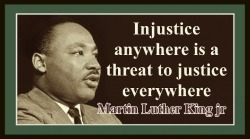Today, we observe the birthday of Martin Luther King, Jr. as a reminder to continue working toward the ideal of "liberty and justice for all." In his famous "I Have a Dream" speech, King wrote:
... we refuse to believe that the bank of justice is bankrupt. We refuse to believe that there are insufficient funds in the great vaults of opportunity of this nation. So we have come to cash this check — a check that will give us upon demand the riches of freedom and the security of justice. We have also come to this hallowed spot to remind America of the fierce urgency of now. This is no time to engage in the luxury of cooling off or to take the tranquilizing drug of gradualism. Now is the time to make real the promises of democracy.
So, how are we doing, almost 50 years later, on that justice thing? It depends, of course, whom you ask. It also depends on whether you see the metaphorical glass as half-empty or half-full. I tend to see it more as a dialectic: it is true both that we're working toward justice, and that we've got a long way to go.
So, how are we doing, almost 50 years later, on that justice thing? It depends, of course, whom you ask. It also depends on whether you see the metaphorical glass as half-empty or half-full. I tend to see it more as a dialectic: it is true both that we're working toward justice, and that we've got a long way to go.
That points to the negative side - it is still true that the majority of power and resources are in the hands of a small group of people...a group that is largely wealthy, White, and male. The Republican primaries are an excellent illustration of that (with the big concession to diversity being Romney's Mormon faith). While there is slightly more racial and gender diversity in the Senate and House of Representatives, our politicians tend to be uniformly wealthy. The degree to which they are out of touch with the rest of the population is clear in the stalemate they've created through petty refusals to compromise, and the resulting all-time low approval rating on 9%.
A part of the mission and responsibility of social work is to advocate for the needs and rights of our clients, many (if not most) of whom face unequal treatment as a result of race, class, or (dis)ability. Mental illness still carries a heavy stigma, and our health insurance structure is more geared toward denying care than providing it. We fight an up-hill battle to get our clients' needs met - needs for treatment, as well as more basic needs (e.g., food, shelter, safety, transportation) that may otherwise create barriers to treatment.
How do you approach this challenge in your work? How do you think about your role as an advocate for justice?

No comments:
Post a Comment